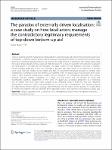Item Infomation

| Title: |
| The paradox of externally driven localisation: a case study on how local actors manage the contradictory legitimacy requirements of top-down bottom-up aid |
| Authors: |
| Mulder, Femke |
| Issue Date: |
| 2023 |
| Publisher: |
| Springer |
| Abstract: |
| There are ongoing calls in the humanitarian and development sectors to localise aid, make it more participatory and involve communities. A common response to these calls by INGOs and national governments is to work with local actors to jointly deliver local, community-based, participatory aid. However, this setup tends to be hierarchical, with external actors taking the lead on project design and local actors on implementation. As a result, key outcomes envisioned for localisation and participation in aid often do not materialise. This paper explores the role legitimacy work plays in maintaining this unhelpful status quo. To this end, it provides a qualitative case study analysis of an aid project in Ethiopia (2016–2020) that was initiated by two INGOs and built on government structures designed to facilitate mass volunteering at community level: the Women’s Development Army. The paper argues that externally driven localisation is often organised around project models that are shaped by two contradictory paradigms: one centring resilience and one centring surveillance. |
| Description: |
| CC-By |
| URI: |
| https://link.springer.com/article/10.1186/s41018-023-00139-0 https://dlib.phenikaa-uni.edu.vn/handle/PNK/9143 |
| Appears in Collections |
| OER - Pháp luật - Thể chế xã hội |
ABSTRACTS VIEWS
113
FULLTEXT VIEWS
58
Files in This Item:
